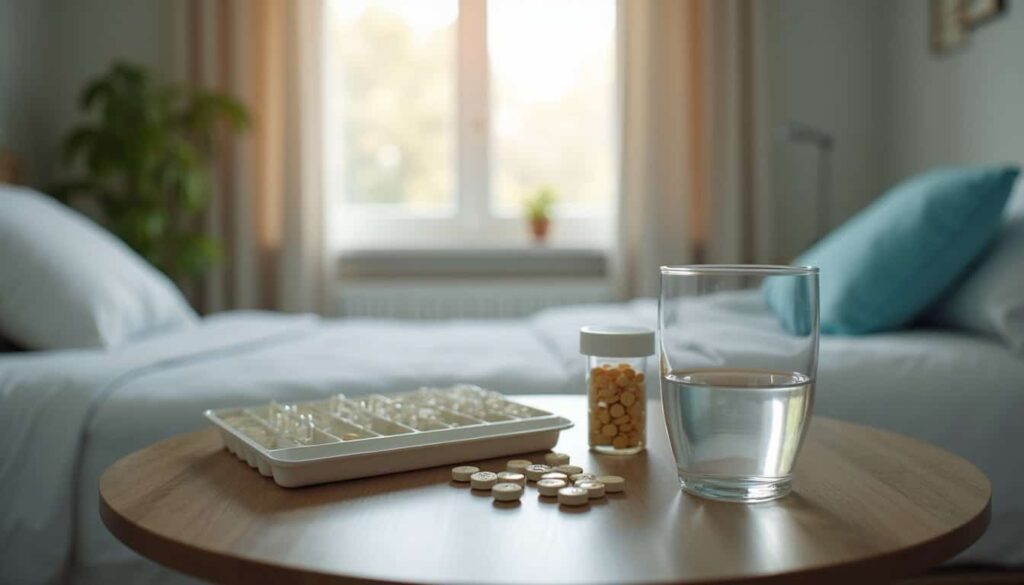Mental health counseling helps you develop effective coping strategies through evidence-based approaches like Cognitive Behavioral Therapy, which addresses depression, anxiety, and relationship challenges. You’ll experience measurable improvements in emotional regulation, communication skills, and daily functioning, with 75% of people seeing significant benefits and 50% showing improvement after just eight sessions. The therapeutic relationship builds resilience and self-awareness that create lasting change, equipping you with tools to manage challenges independently. Understanding the specific outcomes, success factors, and practical considerations will help you make an informed decision about starting your therapeutic journey.
What Mental Health Counseling Actually Does for Your Well-Being

Mental health counseling offers tangible improvements to your psychological well-being that extend far beyond the therapy room. Through evidence-based approaches like CBT, you’ll develop effective coping strategies to manage stress, anxiety, and life changes. Counseling alleviates symptoms of depression and anxiety disorders, conditions affecting over 40 million U.S. adults annually, while reducing reliance on medication alone.
You’ll strengthen your emotional regulation abilities by identifying triggers and understanding your responses. This process increases self-awareness and promotes personal growth as you explore your values and life goals. Therapy helps you replace maladaptive behaviors with healthy alternatives, reframe negative self-perceptions, and build genuine self-acceptance. These evidence-based psychotherapies have been shown to be efficacious, beneficial, and cost-effective for treating psychiatric disorders worldwide. Counseling also increases empathy, allowing you to connect more intimately with yourself and others while improving your willingness to cooperate and maintain healthier relationships. These skills improve your communication abilities, enhance relationship boundaries, and ultimately lead to greater life satisfaction and community participation.
Working with a therapist can significantly increase productivity in your daily life as you develop better focus, motivation, and strategies to overcome obstacles that previously held you back.
The Science Behind Therapy Success Rates and Outcomes
Understanding how well therapy actually works can help you make informed decisions about your mental health treatment. Research shows that approximately 75% of people receiving psychotherapy experience significant improvements, with factors like therapist expertise, your engagement level, and the specific treatment approach all playing pivotal roles in your outcomes. These success rates aren’t just immediate, many therapeutic benefits persist long after your sessions end, particularly when you’ve completed evidence-based treatments like Cognitive Behavioral Therapy. Studies indicate that 50% of clients show improved symptoms after just 8 sessions, demonstrating that meaningful progress can occur relatively quickly in treatment. For those completing CBT specifically, 61.38% achieve remission immediately following treatment, with improvements maintained over extended periods. Research demonstrates that suitable patients achieve successful outcomes three times as often as those with more problematic personality traits or weaker interpersonal abilities.
Therapy Effectiveness: Key Statistics
Research consistently demonstrates that psychotherapy delivers measurable benefits for the majority of people who engage in treatment. Approximately 75% of individuals show some benefit, with 50% experiencing measurable improvement after just eight sessions. You’ll find that therapy often produces lasting results, particularly for depression and anxiety, where it reduces relapse rates compared to medication alone.
Specific treatments show impressive outcomes: ERP therapy reduces OCD-related anxiety by 47.8%. Beyond symptom relief, 87% of therapy participants report enhanced confidence and self-esteem, while 93% consider mental health treatment valuable. Additionally, 66% feel more comfortable sharing sensitive information with a therapist than with others in their personal network, suggesting the therapeutic relationship creates a unique environment for disclosure and healing.
However, demographic disparities and cultural influences markedly affect access and outcomes. Only 6.9% globally receive guideline-consistent treatment, and wide variations exist across countries, highlighting how local resources and cultural factors shape therapeutic effectiveness.
What Influences Treatment Outcomes
While statistics reveal therapy’s overall effectiveness, your personal experience depends on a complex interplay of factors that either strengthen or weaken treatment’s impact.
The therapeutic relationship matters most; your therapist’s empathy, relational skills, and use of complex reflections substantially predict positive change. Their credibility and therapist self-awareness directly influence your engagement and outcomes.
Your own factors play equally important roles: initial symptom severity, motivation levels, and treatment adherence all affect progress. When you perceive treatment as relevant and understand your active role, you’re less likely to drop out. Intrinsic motivation serves as a particularly powerful driver for transformative change throughout your recovery journey.
Structural elements like session frequency and tailored approaches enhance results, while strong support systems and consistent care access facilitate better retention. Beyond outcome measures, treatment duration and cost represent important process factors that influence the overall value and efficiency of mental health care delivery. The quality of your therapeutic alliance ultimately outweighs most other variables in determining success.
Environmental and societal contexts add further complexity, as family support and social circumstances can moderate treatment effectiveness in ways that extend beyond the therapy room itself.
Long-Term Benefits After Therapy
Though therapy’s immediate effects provide welcome relief, the true measure of its value emerges in the years that follow treatment. Research shows 74% of individuals remain free from clinically heightened psychiatric symptoms a decade after starting psychotherapy, with long-term approaches yielding the strongest outcomes. You’ll experience enduring lifestyle changes through improved work ability, enhanced productivity, and fewer missed workdays. The lasting self-awareness you develop equips you to handle future stressors more effectively, while strengthened coping skills protect against symptom recurrence. Your relationships benefit from improved communication patterns and conflict resolution abilities that persist long after sessions end. Cognitive Behavioral Therapy can transform negative thought patterns into healthier ones that continue to serve you long after treatment concludes. Long-term counseling takes a deeper dive into past experiences and current thoughts, addressing complex issues that affect multiple areas of your life. Evidence demonstrates that extensive therapy doesn’t just manage current symptoms; it builds resilience, prevents future episodes, and elevates your overall quality of life for years to come.
Who Benefits Most From Mental Health Counseling
You’ll find that mental health counseling demonstrates high success rates across diverse populations, with research showing significant improvements in symptoms and quality of life for those who engage in treatment. Women are nearly twice as likely to receive mental health treatment compared to men, with 24.7% of women seeking help versus only 13.4% of men. However, the benefits aren’t equally accessible; individuals with severe mental illnesses often face systemic barriers that limit their access to consistent, quality care. Over half of adults with mental health conditions remain untreated, highlighting the substantial gap between those who could benefit from counseling and those who actually receive it. Young adults aged 18-44 show the highest treatment rates at 23.2%, demonstrating increased willingness among younger generations to seek mental health support. Understanding who succeeds in therapy and what obstacles prevent others from receiving help reveals critical gaps in our current mental health system that demand attention.
High Success Rates Overall
Research demonstrates that mental health counseling delivers meaningful results for most people who seek treatment. You’re statistically better off seeking help; the average therapy client performs better than 79% of individuals who don’t pursue treatment. These proven success patterns extend across various conditions and populations.
Approximately 75% of people entering psychotherapy experience some benefit, while 87% report tangible life improvements, including enhanced confidence, happiness, and self-esteem. You’ll find that 86% of clients successfully cope better with their challenges through therapy. Widespread client satisfaction reflects these outcomes, with about 60% of adults reporting significant improvement after completing treatment that includes CBT techniques.
Whether you’re facing depression, anxiety, or general life stressors, evidence consistently supports counseling’s effectiveness in creating measurable, positive change. Decades of scientific study have consistently shown psychotherapy is effective across different populations and mental health concerns.
Severe Mental Illness Outcomes
Beyond symptom management, therapy builds your self-efficacy and resilience, enabling you to manage your condition independently. These improvements translate to better long-term outcomes and sustained recovery periods.
Barriers Limiting Access Today
Despite the proven benefits of mental health counseling, significant barriers prevent millions of Americans from accessing the care they need. You’re likely to encounter obstacles whether you live in urban centers or experience rural urban disparities firsthand.
Key barriers limiting your access include:
- Financial constraints: 80% cite cost as a barrier, with sessions ranging from $100-$200 and only 55% of psychiatrists accepting insurance
- Provider shortages: Over 129 million Americans live in mental health professional shortage areas, with 51% of counties lacking psychiatrists
- Transportation challenges: Limited public transit and travel distances prevent appointment attendance, especially in rural regions
- Stigma: More than 60% avoid care due to shame
- Cultural gaps: Lack of culturally tailored interventions deters minority communities, who are 20-50% less likely to seek services
Different Types of Therapy and Their Proven Results
When you’re seeking mental health support, understanding your therapy options empowers you to make informed decisions about your care. Evidence-based practices have established clear effectiveness across various conditions.
Cognitive Behavioral Therapy (CBT) stands as the most widely practiced approach, helping you alter unhealthy thought patterns to reduce anxiety, depression, and OCD symptoms. Dialectical Behavioral Therapy (DBT) builds on CBT principles, teaching distress tolerance and emotion regulation, particularly effective for borderline personality disorder.
Acceptance and Commitment Therapy (ACT) increases psychological flexibility through mindfulness, proving effective for depression, chronic pain, and substance use disorders. Psychodynamic therapy explores unconscious patterns from past experiences, showing symptom improvement in over 90% of cases.
Different therapy modalities address specific needs. Humanistic therapy emphasizes personal growth and self-acceptance, demonstrating comparable effectiveness to other leading approaches for depression, anxiety, and trauma-related conditions.
How Long-Term Benefits Continue After Tre
One of therapy’s most valuable aspects is its capacity to create lasting change that extends well beyond your final session. Research shows that 62% of patients who completed long-term psychodynamic psychotherapy remained symptom-free a decade later, demonstrating therapy’s enduring impact on your mental health.
The continued skill development and ongoing personal growth you experience include:
- Sustained symptom relief: Your improvements in anxiety, depression, and mood disorders remain stable for years, with fewer relapses than medication alone
- Enhanced work functioning: You’ll maintain better job performance and social relationships long after treatment ends
- Automatic healthy habits: Coping mechanisms and emotional regulation become second nature
- Crisis prevention tools: You’ll retain stress management and problem-solving skills
- Improved quality of life: Greater self-acceptance and confidence persist indefinitely
Barriers That Prevent People From Accessing Mental Health Care
Access to mental health care remains frustratingly out of reach for millions of people who need it most. You’ll face significant structural barriers like provider shortages, especially in rural areas, and long wait times that delay critical treatment. Financial obstacles create immediate roadblocks, high out-of-pocket costs, limited insurance coverage, and fear of expenses prevent many from seeking help altogether.
Demographic inequities compound these challenges. You’re less likely to find culturally informed or linguistically appropriate care if you’re from a minority background. Sociocultural attitudes surrounding mental health perpetuate damaging stigma, making you reluctant to pursue treatment due to fears of judgment or discrimination.
Navigational barriers further complicate access. You might not know where to find appropriate services, face confusing healthcare systems, or encounter language barriers that prevent effective communication with providers.
Cost-Effectiveness and Real-World Application of Counseling Services

Despite common assumptions that mental health treatment drains healthcare budgets, research consistently demonstrates the opposite: counseling services reduce overall medical costs while improving patient outcomes. The comparative treatment cost benefits reveal compelling economic impacts of preventative care, with psychological interventions saving approximately 20% of medical expenses.
Mental health counseling doesn’t drain budgets, it saves them, reducing medical costs by 20% while delivering better patient outcomes.
Key Economic Findings:
- Internet-delivered cognitive behavioral therapy demonstrates dominant cost-effectiveness ratios, showing 89.4% probability of meeting standard healthcare thresholds
- Early intervention prevents costly complications, as delayed treatment creates substantially higher expenses than providing timely care
- Depression management in primary care settings produces $980 cost decreases per patient
- Mental health coverage reduces psychiatric hospitalization days by 57% compared to standard care
- Computer-assisted CBT costs only $3,623 per clinically significant treatment success
Frequently Asked Questions
Can Therapy Make You Worse or Have Negative Effects?
Yes, therapy can sometimes make you worse. Studies show 5-14% of people experience lasting negative effects like worsening symptoms or new problems. You’re at higher risk with improper diagnosis, unethical practices, too few sessions, or poor therapist fit. However, temporary distress during treatment doesn’t always mean harm; it can be part of healing. Openly discussing your progress with your therapist and ensuring timely, adequate care helps minimize these risks considerably.
How Do I Know if My Therapist Is Qualified and Effective?
You can verify your therapist’s qualifications by checking their state licensure status online and confirming they hold credentials like LMHC, LPC, or CCMHC. Look for graduate degrees from accredited programs and specialized training relevant to your needs. Effective therapist expertise shows through their ability to establish collaborative treatment goals, demonstrate DSM knowledge, and explain their therapeutic approach clearly. You’ll feel heard, see gradual progress, and notice they maintain professional boundaries while adapting techniques to your unique situation.
What Should I Do if Therapy Isn’t Working for Me?
If therapy isn’t working, first discuss your concerns openly with your therapist; they can adjust their approach. If issues persist, consider switching therapists; 65% of clients have changed providers, often finding better fit elsewhere. You should explore alternative treatment options, like different modalities or specialists who address your specific needs. Since 39% cite poor therapeutic connection as a dropout factor, finding the right match is indispensable. Don’t hesitate to seek a second opinion or consultation for fresh perspectives on your care.
Is Online Therapy as Effective as In-Person Counseling Sessions?
Yes, online therapy is just as effective as in-person counseling for most mental health conditions. Research shows that online sessions deliver equal results for treating depression, anxiety, and PTSD, with similar satisfaction rates and therapeutic bonds. You’ll often find virtual appointments more convenient and accessible, leading to better adherence. However, if you’re experiencing severe crisis situations or prefer interpreting nonverbal cues, in-person therapy might better suit your needs.
How Often Should I Attend Therapy Sessions for Best Results?
For best results, you’ll want to attend therapy weekly, especially when starting treatment. Research shows that consistent scheduling at regular intervals, ideally once or twice per week, significantly improves outcomes compared to less frequent sessions. As you progress, your therapist may adjust this frequency based on your unique needs and goals. Weekly sessions help you build a strong therapeutic relationship while maintaining momentum in your healing journey, leading to faster recovery and lasting positive change.










